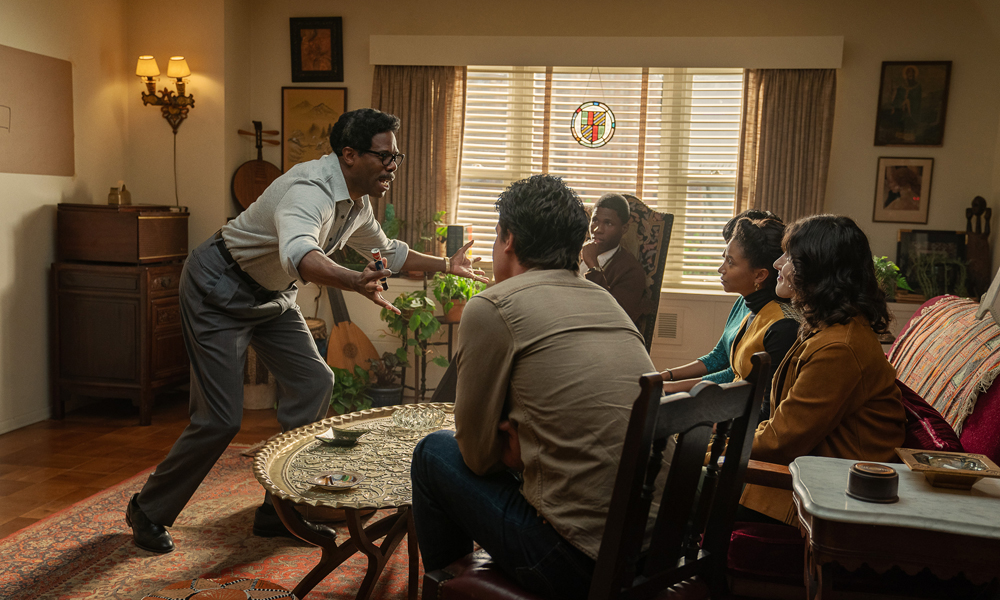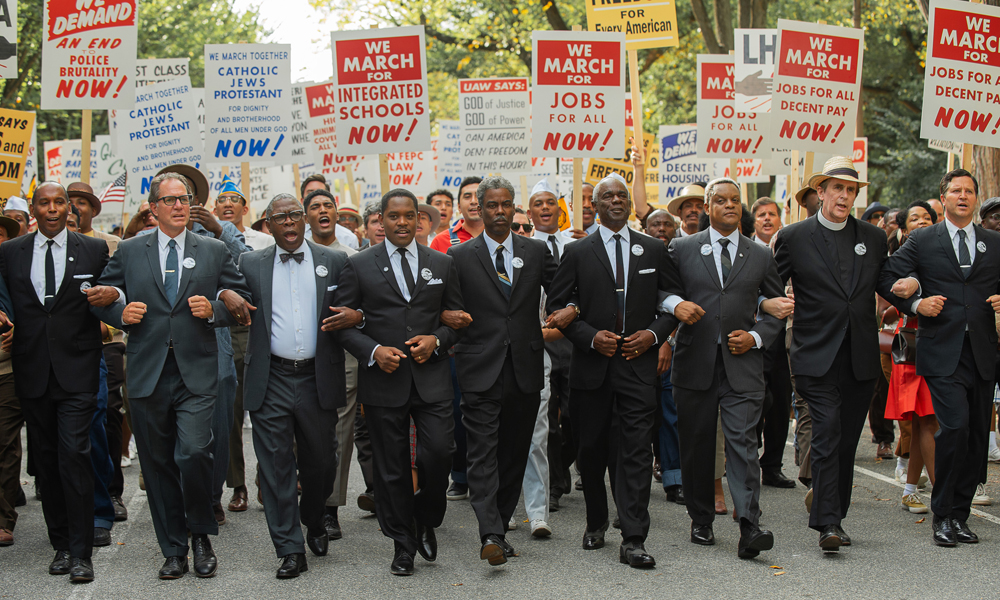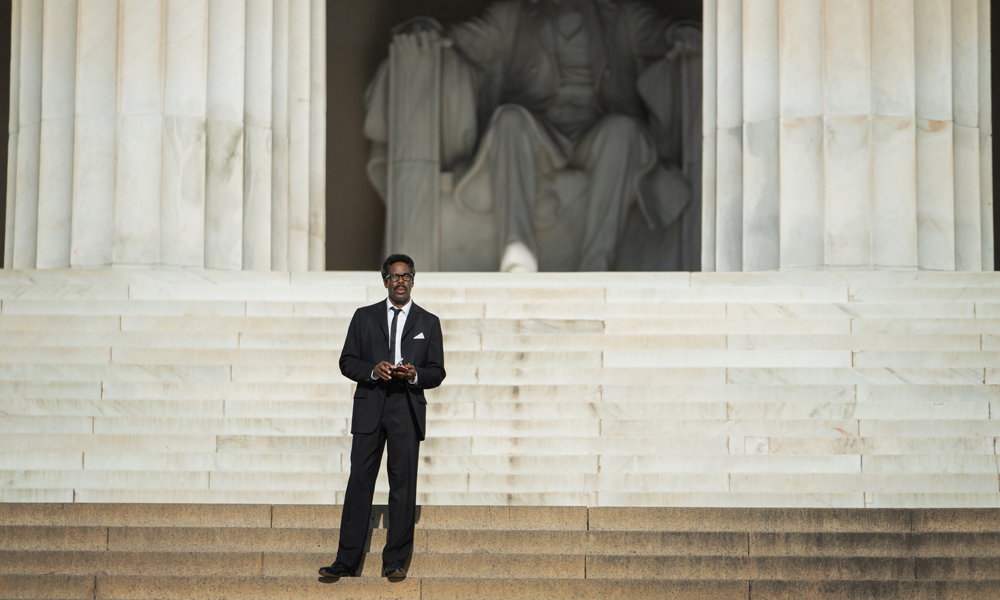Colman Domingo stars in George C. Wolfe’s Rustin as the civil rights leader forced to hide his sexuality in hopes for the greater good…
“On the day that I was born Black, I was also born a homosexual.”
Few Americans know the name Bayard Rustin. A civil rights leader in the 1960s, Rustin has been honored by President Barack Obama posthumously with the Presidential Medal of Freedom. Never a household name but influential nonetheless, Rustin was Martin Luther King Jr.’s deputy and the chief architect of the 1963 March on Washington for Jobs and Freedom.
You might have heard of the March on Washington as it contained one of the most famous speeches ever given in Washington, DC: Martin Luther King Jr.’s “I Have a Dream Speech.” That speech, and the over 250,000 people who flooded the nation’s capital that sweltering August day, would never have existed had it not been for Bayard Rustin. But why do few people know about Rustin’s legacy and what he accomplished in his lifetime?
Well, you see, it’s because he’s gay.
In the 1960s, being gay and Black meant you were relegated to the background of history, regardless of the impact your achievements had at the moment. But with the new film Rustin premiering at the Toronto International Film Festival, audiences can finally witness history and learn about the man who made it.

Rustin stars Emmy-winner Colman Domingo as the titular character, a civil rights movement pioneer who organized large groups to fight for civil and economic rights in the United States. Directed by George C. Wolfe (Ma Rainey’s Black Bottom), the film is written by Julian Breece and Dustin Lance Black (Milk) and executive produced by Barack and Michelle Obama. With heavyweights like these from the top down, it’s clear that this is no ordinary biopic. Bayard Rustin’s life from the 1940s to pivotal moments in the 1960s is at the forefront of this wildly-paced story, complete with supporting performances from Chris Rock, Audra McDonald, CCH Pounder, Michael Potts, Aml Ameen, and CCH Pounder.
Showcasing the importance of Bayard Rustin’s involvement in the civil rights movement is a challenging task. Yet, Colman Domingo is up for the job in what will be considered a career-best for the veteran performer. This film has queer representation across the board, from Domingo himself to the writers, some producers, and director George C. Wolfe. Skillful hands went into making this movie, knowing full well that representation is critical to understanding a complicated legacy like Rustin’s.
Rustin’s sexuality may have forced him into the background at a crossroads moment for Black Americans, but Domingo and Wolfe bring him back to life with vigor and intensity. The film is presented like a play with constrained sets, similar to Wolfe’s previous endeavor with Ma Rainey’s Black Bottom starring Chadwick Boseman. Here, we have an inspirational figure spearheading the story, which makes for a compelling premise involving infighting between union organizers and congressional representatives with Rustin as mediator. With his reputation at stake, investigations by congressional opponents and the FBI, and Communist accusations on the radio almost daily, Bayard Rustin survives with grit and tenacity based solely on the power of grassroots organizing.

Colman Domingo is perfectly cast in Rustin as the out actor thrusts himself into his character and commands almost every scene. With a toothless smile and a voice that could rally the world to meet his demands, Domingo is unafraid to plunge head-first into this role. Rustin’s personal life is on full display, and Domingo doesn’t hold back on portraying an inspirational figure seducing men in his inner circle and those he meets at bars or through mutual friends. Illegal in the 1960s, Rustin survives anti-gay police raids and defamatory remarks by racist Senators.
Rustin isn’t the most memorable biographical film of the last few years, but Colman Domingo’s performance indeed is. Wolfe’s camera tends to be stuck in play mode for much of the film, using artificial-looking sets and costumes that occasionally take the audience out of the story. However, the script’s witty dialogue, Wolfe’s use of big band music in essential moments, and Domingo’s take on Bayard Rustin’s mannerisms, voice, and demeanor more than compensate for the film’s deficits. It’s a rousing good time learning about a man who fought hard for peaceful demonstrations and the opportunity to put political pressure on then-President of the United States, John F. Kennedy.
Bayard Rustin’s life and power might not appear in school history books, but his legacy lives on in Rustin. Typically, a movie about arranging hundreds of buses, temporary washrooms, food, water fountains, and famous people, all in the name of justice, might seem tedious. Yet, Colman Domingo and George C. Wolfe make Rustin’s managing prowess come alive with great ambition. The March on Washington for Jobs and Freedom might have had its flaws in the development stages, but Bayard Rustin accomplished something that will be remembered for all time.
How many of us can say that?
This review was filed from the 2023 Toronto International Film Festival.






POST A COMMENT